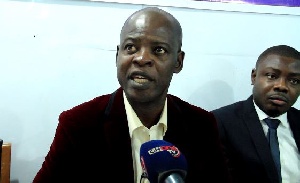The 2017 projects inspections report of the Public Interest and Accountability Committee (PIAC), has revealed that over 50 per cent oil funded schools projects show signs of deterioration in less than three years after completion.
Dr Steve Manteaw, the Chairman, PIAC, made the findings and observations from the inspection of oil funded projects from the Annual Amount (ABFA Budget Funding) report known on Tuesday at a news conference in Accra.
The report cited a six-unit classroom block at Apedwa SDA Primary School in the East Akim District of the Eastern Region, which began to sink due to poor siting and shoddy work according to authorities of the school and the Municipal Assembly.
The PIAC was created as an oversight committee by the Petroleum Act and charged with the responsibility to monitor, evaluate compliance with the law, provide independent assessment and, above all, provide space and platform for the public to debate the management and use of petroleum revenue by government and investments made from it.
The PIAC in line with its mandate in 2017 inspected 40 ABFA funded projects in Ashanti, Eatsern, Greater Accra and Volta Regions; whereas in 2016 it inspected six projects in the Northern, Upper East and West Regions.
Dr Manteaw said the exercise was aimed at gathering and obtaining first-hand information on the quality and impact of projects funded with petroleum revenues at the sub-national levels.
The report said in almost all cases, interactions with beneficiaries and authorities revealed that there was no involvement of communities and beneficiary institutions in the project selection and/or implementation, making tracking and demand for accountability difficult.
It said for instance, at Apedwa SDA Primary School in the East Akim Municipality, the Assembly was unaware of the existence of the ABFA funded project until the PIAC team arrived.
It said several attempts by PIAC to obtain further details of these projects from the Ministry of Education had proved futile.
It said same could be said about the Agogo Saviour D/A Primary School in the Asante Akim North Municipality of the Ashanti Region where both the Municipal Education Directorate and the Assembly denied knowledge of the award of the process of the project; stating that several other cases existed across the districts visited.
According to the report, there was little coordination between the implementing Ministries/Agencies and beneficiary metropolitan, municipal and district assemblies in the selection, award, execution and monitoring of projects.
It said consequently, the implemented projects in the beneficiary communities were usually not aligned with the priority projects in their medium term development plans.
The report said the Ministers of Finance over the years had not complied with the provision of updates on the status of implementation of ABFA funded projects as required by Section (2b) which states “a report from the Minister describing the stage of implementation of the programmed activities funded by and the expenditures incurred on the activities covered by the Annual Budget Funding Amount in the financial year of the report”.
The report said PIAC was of the view that the thin spread of the ABFA funds over hundreds of projects across the length and breadth of the country made compliance with this provision difficult.
The report recommended that the selection of projects should be executed in the districts and be aligned with the assemblies’ medium term development plan which incorporates the development needs of communities; adding that this would ensure the selection of priority projects.
It suggested that relevant MMDAs, stakeholders and beneficiary communities should be actively involved in the selection, award, execution, and monitoring of projects in their jurisdiction to promote inclusiveness and ownership.
It said projects selection should be based on the sufficiency and availability of ABFA funds; stating that selected projects should be fully funded with petroleum revenue to completion to ensure easy tracking of funds and reporting.
It said where the Ministry was unable to fully fund a project with the petroleum revenues, the percentage allocation to the project should be indicated; explaining that this would enhance monitoring and impact analysis.
It urged the implementing Ministries and Agencies of ABAFA funded projects should comply with the practice of mounting sign posts at project sites to enable concerned citizens to demand accountability.
General News of Tuesday, 10 April 2018
Source: ghananewsagency.org













